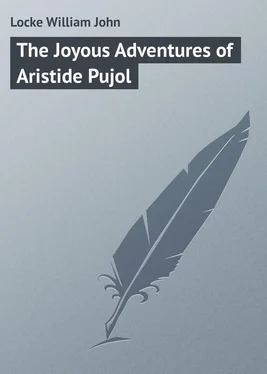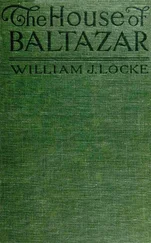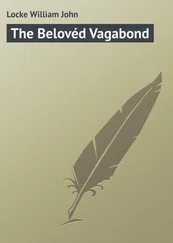William Locke - The Joyous Adventures of Aristide Pujol
Здесь есть возможность читать онлайн «William Locke - The Joyous Adventures of Aristide Pujol» — ознакомительный отрывок электронной книги совершенно бесплатно, а после прочтения отрывка купить полную версию. В некоторых случаях можно слушать аудио, скачать через торрент в формате fb2 и присутствует краткое содержание. Жанр: foreign_language, Прочие приключения, foreign_prose, на английском языке. Описание произведения, (предисловие) а так же отзывы посетителей доступны на портале библиотеки ЛибКат.
- Название:The Joyous Adventures of Aristide Pujol
- Автор:
- Жанр:
- Год:неизвестен
- ISBN:нет данных
- Рейтинг книги:3 / 5. Голосов: 1
-
Избранное:Добавить в избранное
- Отзывы:
-
Ваша оценка:
- 60
- 1
- 2
- 3
- 4
- 5
The Joyous Adventures of Aristide Pujol: краткое содержание, описание и аннотация
Предлагаем к чтению аннотацию, описание, краткое содержание или предисловие (зависит от того, что написал сам автор книги «The Joyous Adventures of Aristide Pujol»). Если вы не нашли необходимую информацию о книге — напишите в комментариях, мы постараемся отыскать её.
The Joyous Adventures of Aristide Pujol — читать онлайн ознакомительный отрывок
Ниже представлен текст книги, разбитый по страницам. Система сохранения места последней прочитанной страницы, позволяет с удобством читать онлайн бесплатно книгу «The Joyous Adventures of Aristide Pujol», без необходимости каждый раз заново искать на чём Вы остановились. Поставьте закладку, и сможете в любой момент перейти на страницу, на которой закончили чтение.
Интервал:
Закладка:
It was on the tip of Aristide’s impulsive tongue to say that he would be only too willing to shelter her, but prudently he refrained.
“She has broken my heart,” continued Bocardon.
Aristide asked for details of the unhappy affair. The large man hesitated for a moment and glanced suspiciously at his companion; but, fascinated by the clear, luminous eyes, he launched with Southern violence into a whirling story. The villain was a traveller in buttons — buttons! To be wronged by a traveller in diamonds might have its compensations – but buttons! Linen buttons, bone buttons, brass buttons, trouser buttons! To be a traveller in the inanity of buttonholes was the only lower degradation. His name was Bondon – he uttered it scathingly, as if to decline from a Bocardon to a Bondon was unthinkable. This Bondon was a regular client of the hotel, and such a client! – who never ordered a bottle of vin cacheté or coffee or cognac. A contemptible creature. For a long time he had his suspicions. Now he was certain. He tossed off his glass of Dubonnet, ordered another, and spoke incoherently of the opening and shutting of doors, whisperings, of a dreadful incident, the central fact of which was a glimpse of Zette gliding wraith-like down a corridor. Lastly, there was the culminating proof, a letter found that morning in Zette’s room. He drew a crumpled sheet from his pocket and handed it to Aristide.
It was a crude, flaming, reprehensible, and entirely damning epistle. Aristide turned cold, shivering at the idea of the superb and dainty Zette coming in contact with such abomination. He hated Bondon with a murderous hate. He drank a great gulp of absinthe and wished it were Bondon’s blood. Great tears rolled down Bocardon’s face, and gathering at the ends of his scrubby moustache dripped in splashes on the marble table.
“I loved her so tenderly, monsieur,” said he.
The cry, so human, went straight to Aristide’s heart. A sympathetic tear glistened in his bright eyes. He was suddenly filled with an immense pity for this grief-stricken, helpless giant. An odd feminine streak ran through his nature and showed itself in queer places. Impulsively he stretched out his hand.
“You’re going?” asked Bocardon.
“No. A sign of good friendship.”
They gripped hands across the table. A new emotion thrilled through the facile Aristide.
“Bocardon, I devote myself to you,” he cried, with a flamboyant gesture. “What can I do?”
“Alas, nothing,” replied the other, miserably.
“And Zette? What does she say to it all?”
The mountainous shoulders heaved with a shrug. “She denies everything. She had never seen the letter until I showed it to her. She did not know how it came into her room. As if that were possible!”
“It’s improbable,” said Aristide, gloomily.
They talked. Bocardon, in a choking voice, told the simple tale of their married happiness. It had been a love-match, different from the ordinary marriages of reason and arrangement. Not a cloud since their wedding-day. They were called the turtle-doves of the Rue de la Curatterie. He had not even manifested the jealousy justifiable in the possessor of so beautiful a wife. He had trusted her implicitly. He was certain of her love. That was enough. They had had one child, who died. Grief had brought them even nearer each other. And now this stroke had been dealt. It was a knife being turned round in his heart. It was agony.
They walked back to the hotel together. Zette, who was sitting by the desk in the bureau, rose and, without a word or look, vanished down the passage. Bocardon, with a great sigh, took her place. It was dinner-time. The half-dozen guests and frequenters filled for a moment the little hall, some waiting to wash their hands at the primitive lavabo by the foot of the stairs. Aristide accompanied them into the salle à manger , where he dined in solemn silence. The dinner over he went out again, passing by the bureau where Bocardon, in its dim recesses, was eating a sad meal brought to him by the melancholy Euphémie. Zette, he conjectured, was dining in the kitchen. An atmosphere of desolation impregnated the place, as though a corpse were somewhere in the house.
Aristide drank his coffee at the nearest café in a complicated state of mind. He had fallen furiously in love with the lady, believing her to be the victim of a jealous husband. In an outburst of generous emotion he had taken the husband to his heart, seeing that he was a good man stricken to death. Now he loved the lady, loved the husband, and hated the villain Bondon. What Aristide felt, he felt fiercely. He would reconcile these two people he loved, and then go and, if not assassinate Bondon, at least do him some bodily injury. With this idea in his head, he paid for his coffee and went back to the hotel.
He found Zette taking her turn at the bureau, for clients have to be attended to, even in the most distressing circumstances. She was talking to a new arrival, trying to smile a welcome. Aristide, loitering near, watched her beautiful face, to which the perfect classic features gave an air of noble purity. His soul revolted at the idea of her mixing herself up with a sordid wretch like Bondon. It was unbelievable.
“ Eh bien ?” she said as soon as they were alone.
“Mme. Zette, to-day I called your husband a scoundrel and a crocodile. I was wrong. I find him a man with a beautiful nature.”
“You needn’t tell me that, M. Aristide.”
“You are breaking his heart, Mme. Zette.”
“And is he not breaking mine? He has told you, I suppose. Am I responsible for what I know nothing more about than a babe unborn? You don’t believe I am speaking the truth? Bah! And your professions this afternoon? Wind and gas, like the words of all men.”
“Mme. Zette,” cried Aristide, “I said I would devote my life to your service, and so I will. I’ll go and find Bondon and kill him.”
He watched her narrowly, but she did not grow pale like a woman whose lover is threatened with mortal peril. She said dryly: —
“You had better have some conversation with him first.”
“Where is he to be found?”
She shrugged her shoulders. “How do I know? He left by the early train this morning that goes in the direction of Tarascon.”
“Then to-morrow,” said Aristide, who knew the ways of commercial travellers, “he will be at Tarascon, or at Avignon, or at Arles.”
“I heard him say that he had just done Arles.”
“ Tant mieux. I shall find him either at Tarascon or Avignon. And by the Tarasque of Sainte-Marthe, I’ll bring you his head and you can put it up outside as a sign and call the place the ‘Hôtel de la Tête Bondon.’”
Early the next morning Aristide started on his quest, without informing the good Bocardon of his intentions. He would go straight to Avignon, as the more likely place. Inquiries at the various hotels would soon enable him to hunt down his quarry; and then – he did not quite know what would happen then – but it would be something picturesque, something entirely unforeseen by Bondon, something to be thrillingly determined by the inspiration of the moment. In any case he would wipe the stain from the family escutcheon. By this time he had convinced himself that he belonged to the Bocardon family.
The only other occupant of the first-class compartment was an elderly Englishwoman of sour aspect. Aristide, his head full of Zette and Bondon, scarcely noticed her. The train started and sped through the sunny land of vine and olive.
They had almost reached Tarascon when a sudden thought hit him between the eyes, like the blow of a fist. He gasped for a moment, then he burst into shrieks of laughter, kicking his legs up and down and waving his arms in maniacal mirth. After that he rose and danced. The sour-faced Englishwoman, in mortal terror, fled into the corridor. She must have reported Aristide’s behaviour to the guard, for in a minute or two that official appeared at the doorway.
Читать дальшеИнтервал:
Закладка:
Похожие книги на «The Joyous Adventures of Aristide Pujol»
Представляем Вашему вниманию похожие книги на «The Joyous Adventures of Aristide Pujol» списком для выбора. Мы отобрали схожую по названию и смыслу литературу в надежде предоставить читателям больше вариантов отыскать новые, интересные, ещё непрочитанные произведения.
Обсуждение, отзывы о книге «The Joyous Adventures of Aristide Pujol» и просто собственные мнения читателей. Оставьте ваши комментарии, напишите, что Вы думаете о произведении, его смысле или главных героях. Укажите что конкретно понравилось, а что нет, и почему Вы так считаете.












